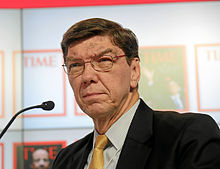This article's use of external links may not follow Wikipedia's policies or guidelines. (March 2024) |
Clayton Christensen | |
|---|---|
 Christensen at the World Economic Forum Annual Meeting in 2013 | |
| Born | Clayton Magleby Christensen April 6, 1952 |
| Died | January 23, 2020 (aged 67) |
| Education | Brigham Young University (B.A.) Queen's College, Oxford (M.Phil.) Harvard University (MBA, DBA) |
| Known for | "Disruption" and "disruptive innovation" concepts The Innovator's Dilemma |
| Website | www |
Clayton Magleby Christensen (April 6, 1952 – January 23, 2020) was an American academic and business consultant who developed the theory of "disruptive innovation", which has been called the most influential business idea of the early 21st century.[1][2] Christensen introduced "disruption" in his 1997 book The Innovator's Dilemma, and it led The Economist to term him "the most influential management thinker of his time."[3][4] He served as the Kim B. Clark Professor of Business Administration at the Harvard Business School (HBS), and was also a leader and writer in the Church of Jesus Christ of Latter-day Saints (LDS Church).[5] He was one of the founders of the Jobs to Be Done development methodology.[6]
Christensen was also a co-founder of Rose Park Advisors, a venture capital firm, and Innosight, a management consulting and investment firm specializing in innovation.[7]
- ^ Cite error: The named reference
economwas invoked but never defined (see the help page). - ^ Wolfe, Alexandra (September 30, 2016). "Clayton Christensen Has a New Theory". Wall Street Journal. Archived from the original on March 9, 2021. Retrieved November 24, 2019.
- ^ Schumpter (January 30, 2020). "Clayton Christensen's insights will outlive him". The Economist. Archived from the original on May 7, 2021. Retrieved February 11, 2020.
- ^ Rifkin, Glenn (January 25, 2020). "Clayton Christensen, Guru of 'Disruptive Innovation,' Dies at 67". The New York Times. Archived from the original on June 19, 2021. Retrieved June 26, 2020.
- ^ Walch, Tad (January 24, 2020). "Clayton Christensen dies at 67 after lifetime of business, spiritual influence". Deseret News. Archived from the original on January 25, 2020. Retrieved February 11, 2020.
- ^ Christensen, Clayton (September 2016). "Know Your Customers' Jobs to Be Done". Harvard Business Review. Archived from the original on August 24, 2020. Retrieved February 1, 2024.
- ^ Cite error: The named reference
sweekwas invoked but never defined (see the help page).